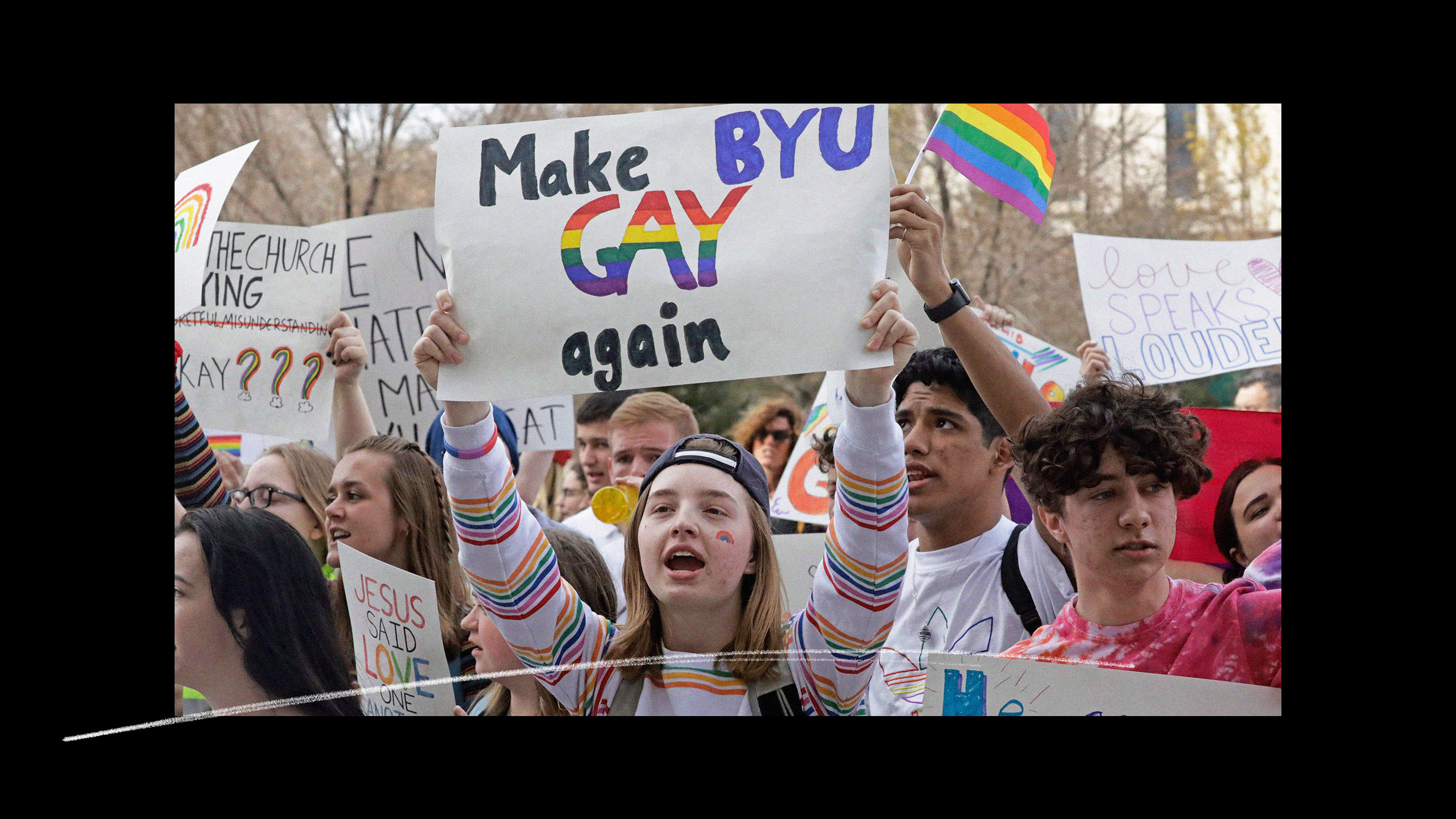Brigham Young University (BYU) is cracking down on student protests after a group of organizers gathered in an unprecedented display of solidarity with the school’s LGBTQ2S+ community last year.
The world’s largest Mormon college released new policies on Jan. 17 banning student protests on Provo, Utah’s iconic Y Mountain, which bears a concrete “Y” near its apex representing the school’s founder, Brigham Young. The 380-by-130-foot display was the site of a March 2021 demonstration in support of LGBTQ2S+ students at BYU, in which an estimated 40 people hiked nearly two kilometres to the top of the trail and lit the “Y” with rainbow LED flashlights.
While the revised Demonstration Policy published on BYU’s website Monday did not mention last year’s events, it also bans protests “within university buildings or facilities, including within outdoor athletic facilities” and “near places where minors and other vulnerable populations are present.” This applies to all BYU schools, including its campuses in Idaho and Hawaii.
Any student who refuses to abide by the rules “may be subject to the university’s disciplinary processes and arrest for trespassing,” according to BYU.
Bradley Talbot, who organized last year’s “Light the Y” gathering, admits to being confused by the timing of the announcement. Talbot was a senior at the time of the event, just weeks away from graduation, and says he expected there would be some blowback from BYU in the form of suspension or expulsion. But aside from a tweet by the school claiming it did not endorse the action, no one ever reached out. He says BYU didn’t even get in touch when the “Y” was lit up a second time last September.
“This is really the first time BYU has actually said anything,” Talbot tells Xtra over the phone. “It’s hurtful because it was the most peaceful, beautiful, simple display that we could have done.”
Administrators at BYU claim that the rule changes were made to help ensure student safety. Carri Jenkins, a spokesperson for the school, cited the potential dangers of climbing to the mountain’s summit in comments to the Salt Lake Tribune. “[That] is certainly a concern, as well as having people comply with our policies while on university property,” she told the newspaper.
But Madi Hawes, a current undergraduate at BYU, says she doesn’t buy that explanation. She notes that the school frequently sponsors hikes to the “Y” throughout the year, including during new student orientations for freshman, homecoming week and graduation. (An October 2014 edition of BYU’s official newsletter advertised an upcoming hike with a special incentive for its most eager participants: “The first 150 students to reach the Y will be given a light bulb to turn on.”)
“I don’t know anyone in my life that believes it’s because of the safety of their students,” Hawes tells Xtra, adding that she’s not aware of an incident involving students being injured on Y Mountain in recent years. “If there was, then you would think they would close the trail.”
Hawes believes BYU’s actions are instead part of a larger pattern of behaviour regarding how the school treats its LGBTQ2S+ student body. The original “Light the Y” demonstration was in response to the school appearing to lift its long-standing ban on “homosexual behaviour” in February 2020 only to backtracka month later. BYU affirmed that same-sex dating would continue to be a violation of its honour code, which prohibited queer students from attending at all until 2007.
LGBTQ2S+ students at BYU have described feeling “whiplash” after the school’s abrupt policy reversal, but more than anything, it reminds Hawes of a favourite Taylor Swift song. In “Dear John,” the singer excoriates the track’s titular love interest, whom she describes as capricious and manipulative: “I lived in your chess game / But you changed the rules every day.”
“That’s what it feels like,” says Hawes, who serves as chair of the student outreach committee for USGA, BYU’s unofficial LGBTQ2S+ student group. “If they hadn’t even made a change, we would have just continued on being discriminated against as normal, but instead, they gave us a gleam of hope and then took it away.”
But organizers say BYU’s attempted crackdown on LGBTQ2S+ student life won’t stop them from being visible in any way they can. In addition to mounting the demonstration at the “Y,” Talbot founded Color the Campus in 2021, a once-a-semester event in which students wear rainbow colours in support of their queer and trans classmates. Each observance of the now-regular tradition garners thousands of participants, both in person and online, and that number is only growing.
More actions in support of LGBTQ2S+ students are being scheduled for the future, both on and off campus. Although Talbot declines to offer specifics as to what’s coming, he says that BYU’s attempt to restrict gatherings on the “Y” misses the point: the event was never approved by the college to begin with, and organizers were under no illusion they would receive support from the school.
“We never wanted permission to do things,” Talbot says. “We never planned on getting permission to do things. That’s kind of the point: being a little defiant in the name of love and support and for a good cause. We are continuing to prepare for what we had already planned.”


 Why you can trust Xtra
Why you can trust Xtra


